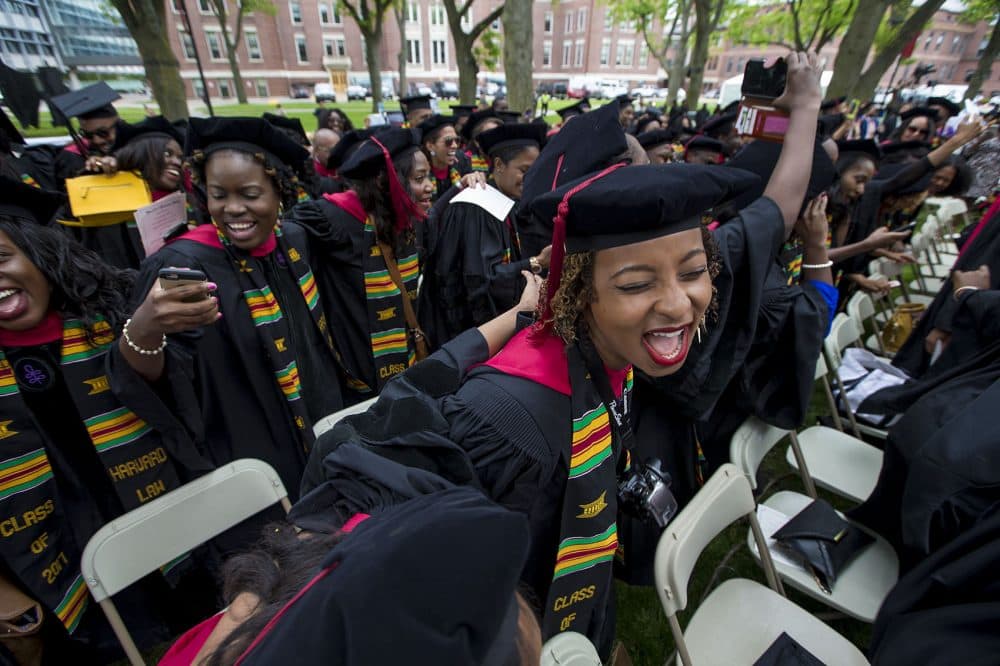Advertisement
Mass. Tops In Nation In Public Higher Ed Equity Report

Massachusetts leads the nation in equity among black students at public colleges and universities, according to a new report out Tuesday.
The nationwide report card, issued by the University of Southern California Race and Equity Center, also awarded the Massachusetts College of Liberal Arts in North Adams, the highest "equity index score" of the institutions studied, a distinction shared with two other schools.
Higher Education Commissioner Carlos Santiago said the rankings reflect a "strategic initiative" the state's public campuses have pursued for the last few years to support students who have been historically underserved, a group he said largely consists of black and Latino students.
"We know that it's more important than ever for the Massachusetts economy to bring in these populations that have been historically underserved, so I think you're going to see a greater focus on these kinds of issues and interventions that are going to help very targeted populations in the commonwealth," Santiago told the News Service.
The report graded schools on four criteria: the degree to which the number of black undergraduates reflects their representation among 18- to 24-year-old citizens in the state; the proportionality of black women and men's respective shares of black student enrollment to the national gender enrollment breakdown across all races; the extent to which six-year graduation rates for black students match overall six-year graduation rates; and the ratio of full-time black undergraduates to full-time black faculty members.
"This report should not be misused to reinforce deficit narratives about Black undergraduates," the report's authors wrote. "Problematic trends presented herein are not fully explained by the failure of K-12 schools to effectively prepare these students for college admission and success or to bad parenting, student disengagement, and low motivation. They also are attributable to institutional practices, policies, mindsets, and cultures that persistently disadvantage Black students and sustain inequities."
Black students of college age are underenrolled relative to residency at more than three quarters of public colleges and universities nationwide, the review found.
The report notes that high marks "are not necessarily indicators of exceptional performance" but reflect a level of equity between black students and comparison groups. The report's authors said they wanted state higher education leaders "to respond by swiftly engaging in rigorous, strategic, and collaborative work to improve the status of Black undergraduates at their institutions."
Massachusetts, at 2.81, had the highest statewide equity index score. Louisiana's 1.18 was the lowest.
The report lands the day after members of the new Massachusetts Education Equity Partnership visited the State House to deliver lawmakers copies of a report highlighting racial and economic disparities in Bay State K-12 schools.
Fewer than one in three black and Latino students who take the SAT meet college-readiness benchmarks in reading and math, compared to two-thirds of their white peers, according to the group's statistics. They said one out of three English language learners do not graduate on time, and one out of seven drop out of school entirely.
"I think there are lessons that can be learned from the success of the African-American students at our institutions, and those lessons can be transferred to other groups on the campus," Santiago said. "I think it's going to take us a while to close some of those gaps, but I think we're moving in the right direction."
In terms of individual colleges and universities, the USC report placed the Massachusetts College of Liberal Arts, University of California-San Diego and Kentucky's University of Louisville in a three-way tie at the top of the list.
Two state universities, Fitchburg State and Framingham State, also made the top ten.
At MCLA, a 1,822-undergraduate school in Berkshire County, black students make up 10 percent of the population, compared to 9 percent of the 18- to 24-year-olds in Massachusetts, according to the report. MCLA's overall graduation rate is 53.4 percent, and 55.6 percent for black students.
Santiago said MCLA recruits students from Boston and recognizes the importance of providing a welcoming environment and support for students of diverse backgrounds.
"They take a lot of care of those students who come to them," he said. "There's not a lot of them, we're not talking about thousands of students who come from Boston, but the ones that do do well."